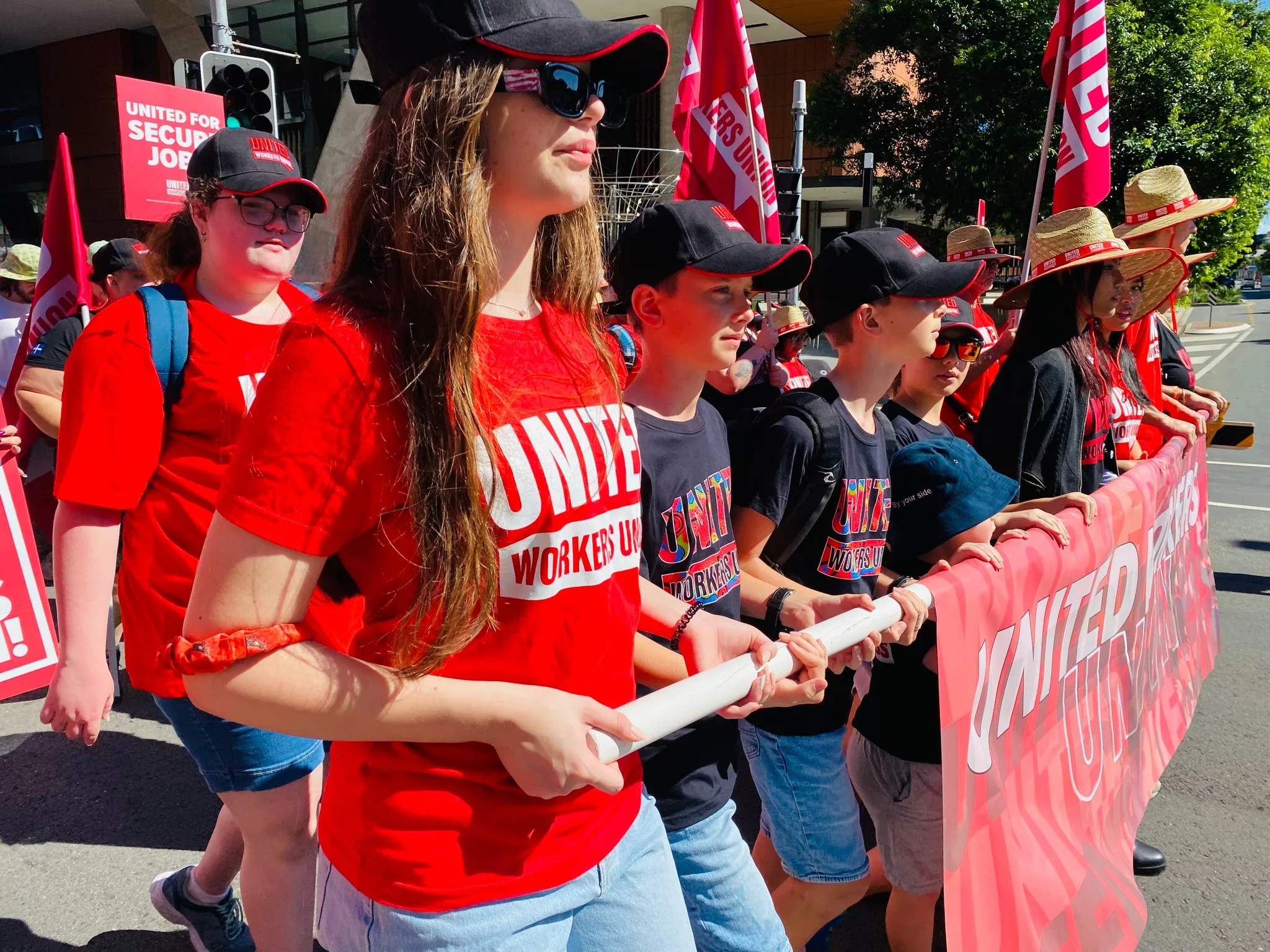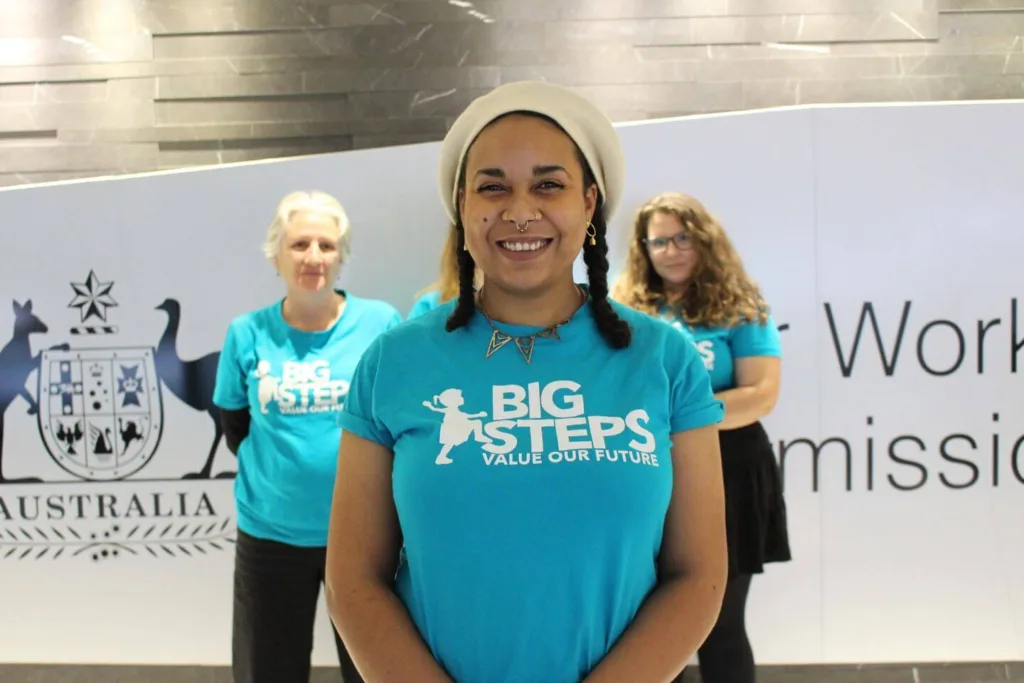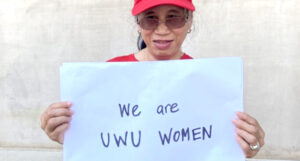
“When women suffer economic disadvantage, it goes right through their lives. If you can’t pay rent, if you can’t retire with super – all of those things affect your equality in society, and so, this is an issue of justice and a priority for the budget.“
Sally McManus, ACTU
The federal budget is out on May 14 and we’re shining a light on the gender equality issues that UWU members care most about.
The Federal Budget announcement is important because it tells us what the government’s priorities are. Business and industry associations, charities, not-for-profits, and other lobby groups all fight for their piece of the pie.
Unions have always been – and will continue to be – active in this process. We work to promote awareness and bring attention to important issues affecting our members, to convince the government to make real change.
We’ve been fighting for over a century for higher wages, better safety, and respect for women at work. There have been great gains over recent decades to support women workers, such as equal pay legislation, carer’s leave, 26 weeks paid parental leave, workplace flexibility, and abortion rights.
But official data paints a different picture: the gender pay gap is 21.7 per cent, women are retiring in poverty with a third of what men have in super, discrimination and harassment at work, and violence against women at home and in the community, are rife. There’s obviously more work to be done to achieve safety, equality and respect for all women.
We asked UWU members what their priorities are for how the Albanese government could make a real difference on gender equality.
1. Increase the minimum wage so it’s a living wage
Last year, after strong campaigning by unions, the Fair Work Commission increased the minimum wage substantially, but unfortunately it’s still not enough – especially during a cost-of-living crisis.
It’s welcome (and overdue!) that the government has been doing some work towards addressing underpaid and undervalued essential workers. They listened to UWU members and funded two consecutive pay rises for aged care workers that contributed to a 25 per cent boost to wages in the sector.
But, fighting every year for an increase above inflation just doesn’t cut it. We need law reform that guarantees the minimum wage will not slip below 60 per cent of Australia’s middle income earners.
Australia used to have one of the highest minimum wages in the world. But in 2021 it slipped down as low as 51 per cent of the median wage.
In 2023, the Commission’s decision to award a 5.75 per cent increase means our minimum wage is higher than the US, Japan, and Ireland who are all below 50 per cent. But, it’s below the UK (at 58 per cent) and New Zealand (at 71 per cent).
We welcomed changes in 2022 to the Secure Jobs Better Pay legislation that requires the Commission to consider the undervaluation of female dominated industries, but only law reform will fix the currently broken process to ensure the minimum wage is a living wage.
That so many women workers are in low-paid industries, reform should be a priority for the government to achieve equal pay.

2. Free, high-quality, universal childhood education and care
Congratulations to our union members who have fought together for decades, grown union support through joining up more members, staging walkouts, lobbying and building community support for such an important campaign. UWU’s Director of Carolyn Early Childhood Education said the wage rise “is welcome, and desperately needed to address the continuing workforce crisis in the sector.”
We know as UWU members that the early childhood education and care sector is dominated by women workers who are so underpaid, they can find it difficult to stay in the sector. This translates to high staff turnover and workers living in poverty.
Early childhood education and care is crucial to all working parents because so many – especially mothers – need access just to be able to participate in the workforce.
Access to high quality early childhood education has broad benefits to society as a whole, especially regarding outcomes for kids from disadvantaged backgrounds. The Albanese government has recognised this and introduced a swathe of subsidies for families to make early education more affordable.
Yet still, the sector is in crisis. It’s unaffordable for many parents and waitlists are ridiculous. That’s why the government needs to do more to support early childhood educators.
UWU is campaigning for a 25 per cent wage rise for ECEC workers.
The government is saying a lot of positive things about investing in the sector. Now is the time to back educators in with a real payrise.
A significant wage increase of 25 per cent would mean early childhood educators could remain in the sector and attract more workers to ease the staff shortages. You can sign our petition here.

3. Reform superannuation to close the retirement gap
Women are retiring with a third less superannuation than men.
Even in industries where women are paid high wages, those who’ve taken a career break to have children, retire with less. Others retire early due to symptoms of menopause or care responsibilities of elderly or disabled relatives. For many older women, policies to correct this imbalance are coming way too late. Women over 55 are the fastest growing group experiencing homelessness.
The government’s Women’s Budget Statement acknowledges that “women’s lower workforce participation and lower pay per hour compound over a lifetime”.
An investment of $199.8m (Women’s Budget Statement, p.25) in increasing benefits for disadvantaged groups will go some way to improving the lives of women retiring in poverty.
The union movement was pivotal in winning compulsory employer contributions to superannuation. Now we are campaigning to raise the super guarantee for women to a 15 per cent minimum, and extending super payments for parental and unpaid carer’s leave. These reforms mean women would not be penalised for taking time off work to care for others.
4. End gendered violence and discrimination through prevention and accountability
“All women and children should be able to live safely without fear, whether at home, at school, at work, in their community or online.” (Federal Government Women’s Budget Statement)
Many women leave jobs rather than face the consequences of addressing sexual harassment in the workplace or via social media.
Unions have recognised sexual harassment as a key issue in women’s employment security and won changes to the Sex Discrimination Act that make employers responsible for sexual harassment in the workplace.
We’ve also fought for – and won – 10 days domestic violence leave and it is now a National Employment Standard available to all workers.
The government has also announced a $5,000 emergency relief payment for women escaping violence by a partner.
In recognition of the rise in cyber-abuse, the government is promising $134.1 million to fund the Office of the eSafety Commissioner (Women’s Budget Statement, p. 55).
The government has promised a further $589.3m to support women facing harassment and violence (Women’s Budget Statement, p.7), with a particular focus on First Nations women.
The government response to gendered violence has definitely been heading in the right direction and unions will continue to shine a light on how violence against women affects their ability to sustain a livelihood, be safe and respected.

5. Reproductive leave and Medicare-funded abortions
Menstruation, pregnancy, childbirth, and menopause are all natural stages in reproductive biology. The problem is, these life stages take many women out of the workforce for long stretches of time – and are costly.
Research has shown women’s healthcare costs more and there are fewer rebates. Abortion, endometriosis diagnosis, gender affirmation and ultrasounds are unaffordable for many women and girls, even after Medicare.
Unions have already won 26 weeks paid parental leave, rights to flexible work and to extend unpaid parental leave.
Now we are seeking more rights including free Medicare-funded abortions, extending paid parental leave to 52 weeks, and 12 days of reproductive leave in recognition of menstruation and menopause.




